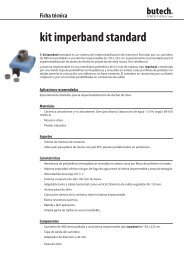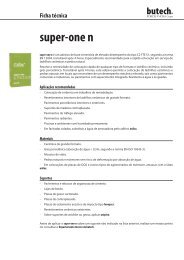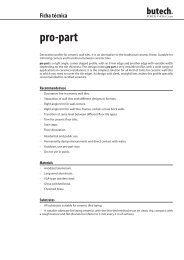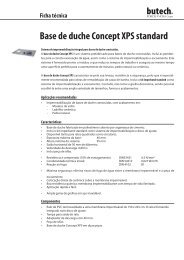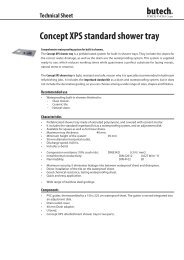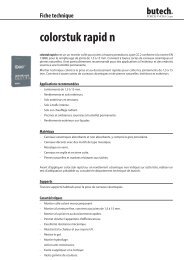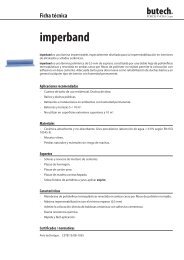You also want an ePaper? Increase the reach of your titles
YUMPU automatically turns print PDFs into web optimized ePapers that Google loves.
pedestals psa<br />
It is supplied in a unique version with adjustment under the head to cover a range of nominal heights of finished pavement of a minimum of 110 mm up<br />
to 500 mm.<br />
The nominal height of the finished pavement is achieved by adding the thickness of the panel to the nominal height of the pedestal. The pedestal<br />
is made completely of steel with galvanized superficial treatment of minimum thickness of 3μ by galvanizing bath based on chromium ions electro<br />
deposited, applied to all surfaces.<br />
The pedestal consists of two main elements: the head riveted to the screwed bolt and base disc riveted to the tube.<br />
The pedestals are supplied with joints to the head, semi-rigid plastic printing, black, conductor, carrying an anti vibration function of air sealing and<br />
centering of the panel.<br />
It recognizes that the <strong>raised</strong> technical floor has obtained the certification PSA Medium Grade with the following settings:<br />
• 35SF panel<br />
• Structure with pedestal of nominal height of 410 mm, set at a maximum height of 450 mm, and stringers of type “P”.<br />
Therefore, for heights higher to 450 mm and with panels or other structures, the obtained certification is not applicable.<br />
overview of the pedestal<br />
Model U.M. 75 95 130 170 200 260 310 360 410<br />
Version With adjustment under the head<br />
Nominal height mm 75 95 130 170 200 260 310 360 410<br />
Nominal range of height adjustment mm ±15 ±15 ±30 ±30 ±30 ±40 ±40 ±40 ±40<br />
Permissible axial load with safety factor 2 (according to UNI EN<br />
12825)(*)<br />
The following is an overview of the pedestal above mentioned.<br />
kN 70 70 70 68 65 60 48 35 26<br />
(*): The permissible axial load is the load indicated to the first deformation. The breaking load or collapse load is obtained by multiplying the<br />
permissible axial safety factor equal to 2.<br />
16




